Boardman J., Hammond N.G. L. The Cambridge Ancient History Volume 3, Part 3: The Expansion of the Greek World, Eighth to Sixth Centuries BC
Подождите немного. Документ загружается.

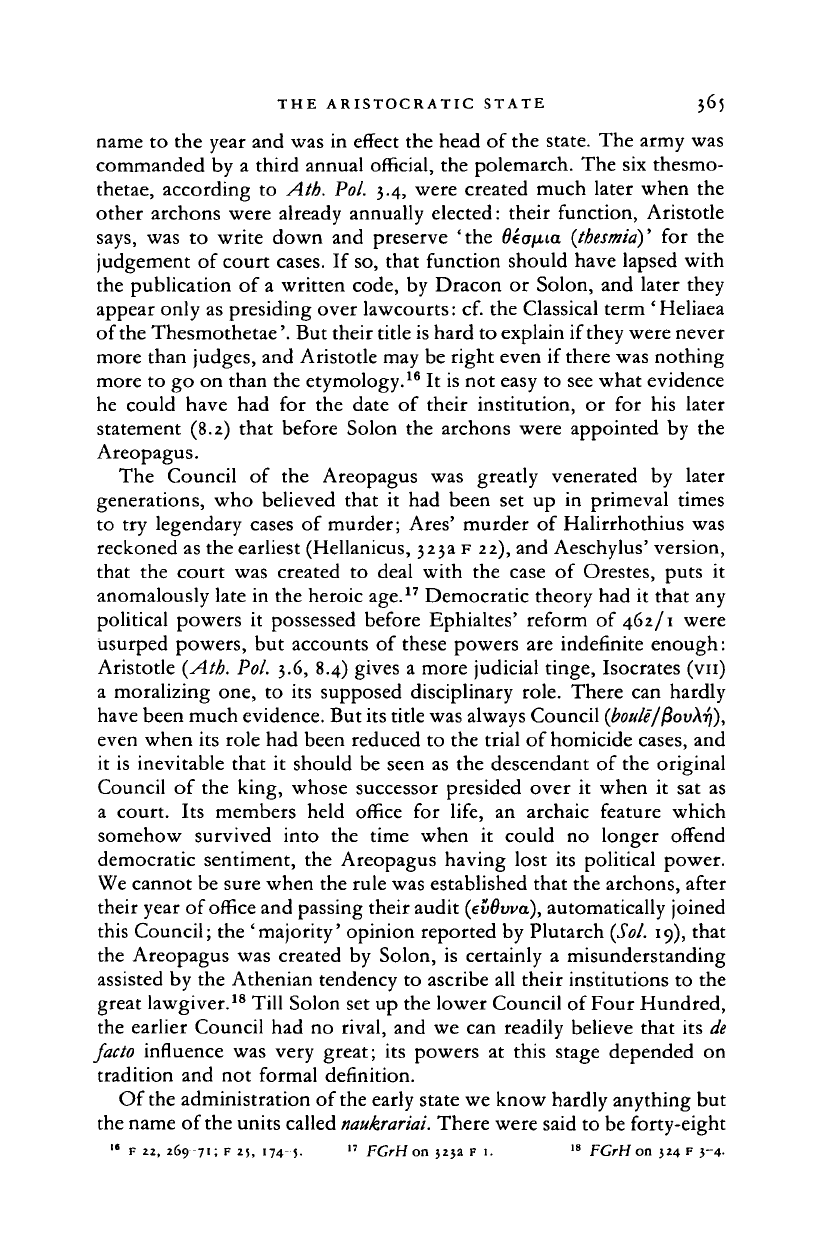
THE ARISTOCRATIC STATE 365
name to the year and was in effect the head of the state. The army was
commanded by a third annual official, the polemarch. The six thesmo-
thetae, according
to Ath.
Pol. 3.4, were created much later when the
other archons were already annually elected: their function, Aristotle
says,
was
to
write down and preserve 'the deafiia (thesmia)'
for the
judgement of court cases.
If
so, that function should have lapsed with
the publication of a written code, by Dracon
or
Solon, and later they
appear only as presiding over lawcourts: cf. the Classical term 'Heliaea
of the Thesmothetae'. But their title is hard to explain if they were never
more than judges, and Aristotle may be right even if there was nothing
more to go on than the etymology.
16
It is not easy to see what evidence
he could have had
for the
date
of
their institution,
or for his
later
statement (8.2) that before Solon the archons were appointed by
the
Areopagus.
The Council
of the
Areopagus
was
greatly venerated
by
later
generations, who believed that
it
had been
set up in
primeval times
to try legendary cases
of
murder; Ares' murder
of
Halirrhothius was
reckoned as the earliest (Hellanicus, 323a
F
22), and Aeschylus' version,
that
the
court was created
to
deal with
the
case
of
Orestes, puts
it
anomalously late in the heroic age.
17
Democratic theory had
it
that any
political powers
it
possessed before Ephialtes' reform
of
462/1 were
usurped powers, but accounts
of
these powers are indefinite enough:
Aristotle {Ath. Pol. 3.6, 8.4) gives a more judicial tinge, Isocrates (vn)
a moralizing one,
to its
supposed disciplinary role. There can hardly
have been much evidence. But its title was always Council
(boule/^ovXif),
even when its role had been reduced to the trial of homicide cases, and
it is inevitable that
it
should be seen as the descendant
of
the original
Council
of
the king, whose successor presided over
it
when
it
sat
as
a court.
Its
members held office
for
life,
an
archaic feature which
somehow survived into
the
time when
it
could
no
longer offend
democratic sentiment, the Areopagus having lost
its
political power.
We cannot be sure when the rule was established that the archons, after
their year of office and passing their audit
(evdvva),
automatically joined
this Council; the 'majority' opinion reported by Plutarch
(Sol.
19), that
the Areopagus was created
by
Solon,
is
certainly
a
misunderstanding
assisted by the Athenian tendency to ascribe all their institutions to the
great lawgiver.
18
Till Solon set up the lower Council of Four Hundred,
the earlier Council had no rival, and we can readily believe that its
de
facto influence was very great;
its
powers
at
this stage depended
on
tradition and not formal definition.
Of the administration of the early state we know hardly anything but
the name of the units called
naukrariai.
There were said to be forty-eight
"
F
22, 269 71;
F
25,
174 5. "
FGrH
on
323a
F 1.
l8
FGrH on 324
F 3-4.
Cambridge Histories Online © Cambridge University Press, 2008
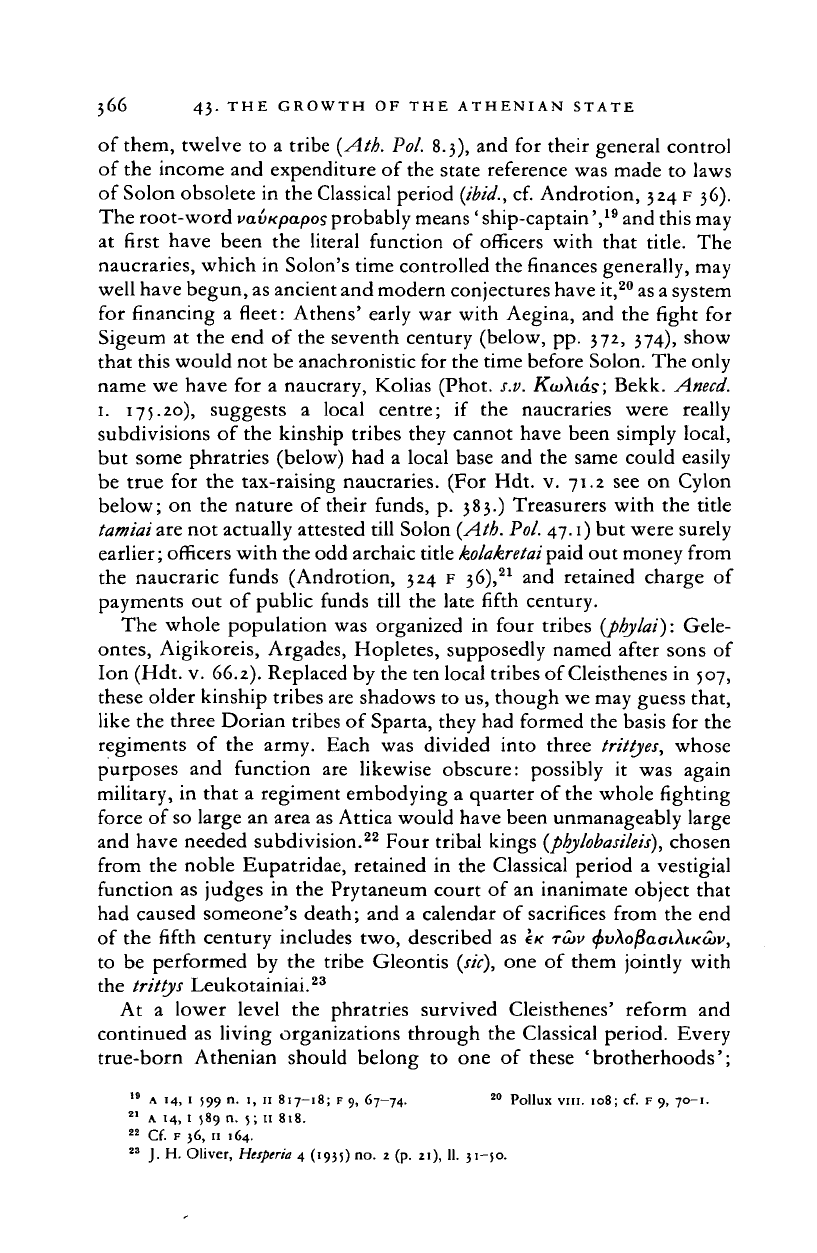
366 43-
THE
GROWTH OF THE ATHENIAN STATE
of them, twelve to a tribe {Ath. Pol. 8.3), and for their general control
of the income and expenditure of the state reference was made to laws
of Solon obsolete in the Classical period
{ibid.,
cf. Androtion, 324
F
36).
The root-word vavxpaposprobably means 'ship-captain',
19
and this may
at first have been the literal function of officers with that title. The
naucraries, which in Solon's time controlled the finances generally, may
well have begun, as ancient and modern conjectures have it,
20
as a system
for financing a fleet: Athens' early war with Aegina, and the
fight
for
Sigeum at the end of the seventh century (below, pp. 372, 374), show
that this would not be anachronistic for the time before Solon. The only
name we have for a naucrary, Kolias (Phot. s.v.
KotXias;
Bekk.
Anecd.
1.
175.20), suggests
a
local centre;
if
the naucraries were really
subdivisions of the kinship tribes they cannot have been simply local,
but some phratries (below) had a local base and the same could easily
be true for the tax-raising naucraries. (For Hdt. v. 71.2 see on Cylon
below; on the nature of their funds, p. 383.) Treasurers with the title
tamiai
are not actually attested till Solon {Ath.
Pol.
47.1) but were surely
earlier; officers with the odd archaic title
kolakretai
paid out money from
the naucraric funds (Androtion, 324 F 36),
21
and retained charge of
payments out of public funds till the late fifth century.
The whole population was organized in four tribes {phylai): Gele-
ontes,
Aigikoreis, Argades, Hopletes, supposedly named after sons of
Ion (Hdt. v. 66.2). Replaced by the ten local tribes of Cleisthenes in 507,
these older kinship tribes are shadows to us, though we may guess that,
like the three Dorian tribes of Sparta, they had formed the basis for the
regiments of the army. Each was divided into three trittyes, whose
purposes and function are likewise obscure: possibly
it
was again
military, in that a regiment embodying a quarter of the whole fighting
force of so large an area as Attica would have been unmanageably large
and have needed subdivision.
22
Four tribal kings
{phylobasileis),
chosen
from the noble Eupatridae, retained in the Classical period a vestigial
function as judges in the Prytaneum court of an inanimate object that
had caused someone's death; and a calendar of sacrifices from the end
of the fifth century includes two, described as IK rutv
<f>v\of$aotAi.Ka>v,
to be performed by the tribe Gleontis
{sic),
one of them jointly with
the trittys Leukotainiai.
23
At
a
lower level the phratries survived Cleisthenes' reform and
continued as living organizations through the Classical period. Every
true-born Athenian should belong to one of these 'brotherhoods';
19
A 14, 1 599 n. 1, 11
817-18;
F 9,
67-74.
20
Pollux
vm. 108; cf. F 9, 70-1.
21
A 14,
1
589 n. 5;
11
818.
22
Cf.
F
36,
11
164.
23
J.
H.
Oliver,
Hespcria
4
(193;)
no. 2 (p. 21),
11. 31-50.
Cambridge Histories Online © Cambridge University Press, 2008
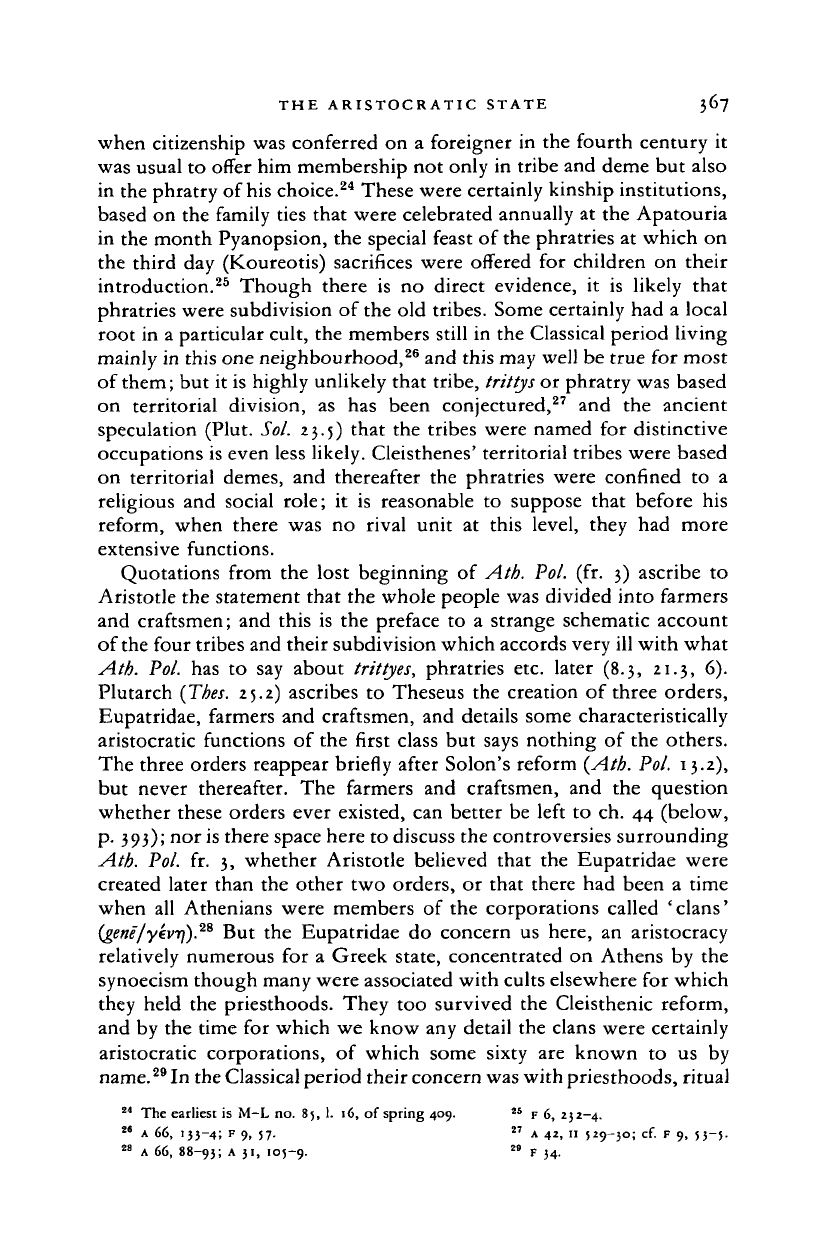
THE ARISTOCRATIC STATE 367
when citizenship was conferred on a foreigner in the fourth century it
was usual to offer him membership not only in tribe and deme but also
in the phratry of his choice.
24
These were certainly kinship institutions,
based on the family ties that were celebrated annually at the Apatouria
in the month Pyanopsion, the special feast of the phratries at which on
the third day (Koureotis) sacrifices were offered for children on their
introduction.
25
Though there is no direct evidence,
it
is likely that
phratries were subdivision of the old tribes. Some certainly had a local
root in a particular cult, the members still in the Classical period living
mainly in this one neighbourhood,
26
and this may well be true for most
of them; but it is highly unlikely that tribe, trittys or phratry was based
on territorial division,
as
has been conjectured,
27
and the ancient
speculation (Plut. Sol. 23.5) that the tribes were named for distinctive
occupations is even less likely. Cleisthenes' territorial tribes were based
on territorial demes, and thereafter the phratries were confined to
a
religious and social role;
it
is reasonable to suppose that before his
reform, when there was no rival unit
at
this level, they had more
extensive functions.
Quotations from the lost beginning of Ath. Pol. (fr. 3) ascribe to
Aristotle the statement that the whole people was divided into farmers
and craftsmen; and this is the preface to a strange schematic account
of
the
four tribes and their subdivision which accords very ill with what
Ath.
Pol. has to say about trittyes, phratries etc. later (8.3, 21.3, 6).
Plutarch
(Thes.
25.2) ascribes to Theseus the creation of three orders,
Eupatridae, farmers and craftsmen, and details some characteristically
aristocratic functions of the first class but says nothing of the others.
The three orders reappear briefly after Solon's reform {Ath. Pol. 13.2),
but never thereafter. The farmers and craftsmen, and the question
whether these orders ever existed, can better be left to ch. 44 (below,
p.
393); nor is there space here to discuss the controversies surrounding
Ath.
Pol.
fr.
3, whether Aristotle believed that the Eupatridae were
created later than the other two orders, or that there had been a time
when all Athenians were members of the corporations called 'clans'
(gene/yevrj).
28
But the Eupatridae do concern us here, an aristocracy
relatively numerous for a Greek state, concentrated on Athens by the
synoecism though many were associated with cults elsewhere for which
they held the priesthoods. They too survived the Cleisthenic reform,
and by the time for which we know any detail the clans were certainly
aristocratic corporations,
of
which some sixty are known
to
us by
name.
29
In the Classical period their concern was with priesthoods, ritual
24
The earliest is M-L no. 85, 1. 16, of spring 409.
"
F 6, 232-4.
26
A 66, 133-4; F 9, 57.
"
A 42, 11 529-30; cf. F 9, 53-5.
28
A 66,
88-93;
A 31, 105-9.
28 F
34-
Cambridge Histories Online © Cambridge University Press, 2008
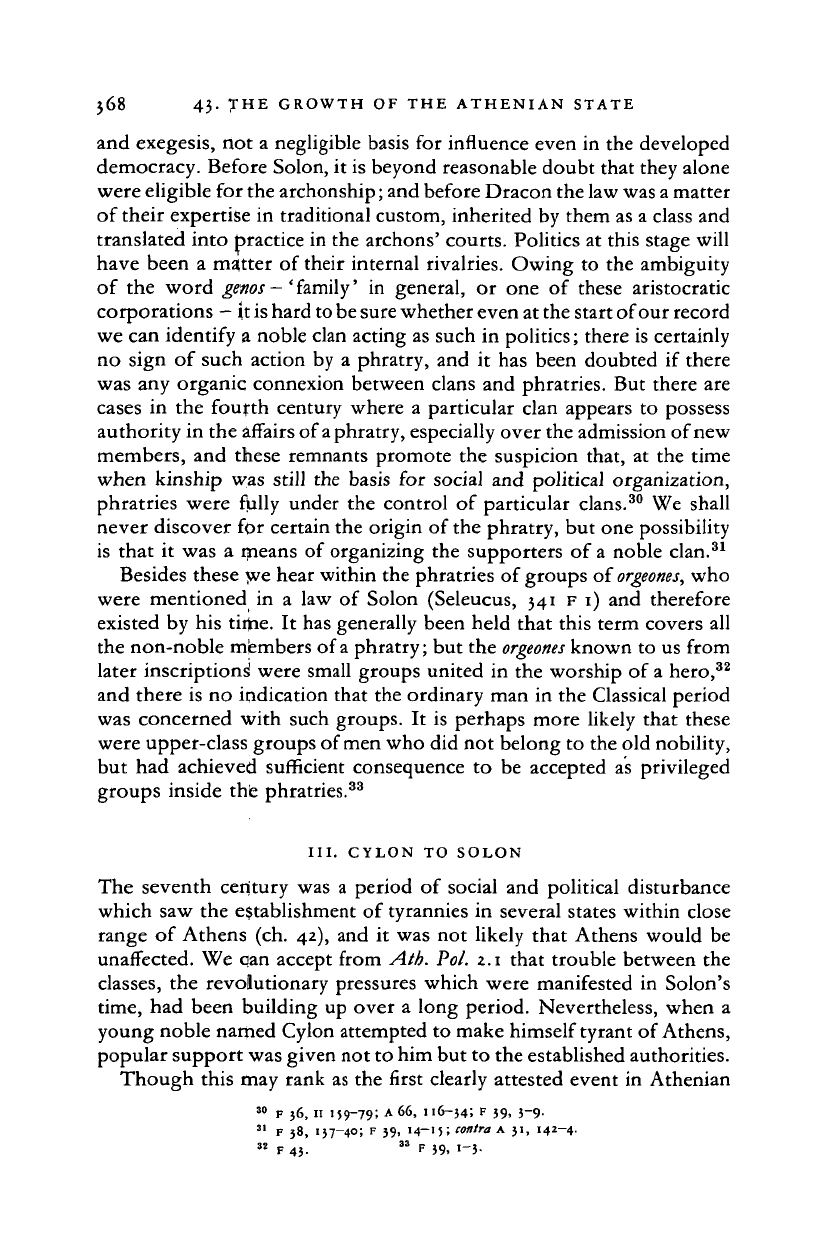
}68 43- THE GROWTH OF THE ATHENIAN STATE
and exegesis,
not a
negligible basis
for
influence even
in the
developed
democracy. Before Solon,
it
is beyond reasonable doubt that they alone
were eligible
for
the archonship; and before Dracon the law was a matter
of their expertise
in
traditional custom, inherited
by
them as
a
class and
translated into practice
in
the archons' courts. Politics
at
this stage will
have been
a
matter
of
their internal rivalries. Owing
to the
ambiguity
of
the
word
genos
-
'
family'
in
general,
or one of
these aristocratic
corporations
—
it
is
hard
to
be sure whether even at the start of our record
we can identify
a
noble clan acting
as
such
in
politics; there
is
certainly
no sign
of
such action
by a
phratry,
and it has
been doubted
if
there
was
any
organic connexion between clans
and
phratries.
But
there
are
cases
in the
fourth century where
a
particular clan appears
to
possess
authority
in
the affairs of
a
phratry, especially over the admission of new
members,
and
these remnants promote
the
suspicion that,
at the
time
when kinship
was
still
the
basis
for
social
and
political organization,
phratries were fully under
the
control
of
particular clans.
30
We
shall
never discover
for
certain the origin
of
the phratry,
but
one possibility
is that
it was a
means
of
organizing
the
supporters
of
a noble clan.
31
Besides these we hear within the phratries
of
groups
of
orgeones,
who
were mentioned
in a law of
Solon (Seleucus,
341 F 1) and
therefore
existed
by his
tirjie.
It
has generally been held that this term covers
all
the non-noble miembers of a phratry;
but
the
orgeones
known
to us
from
later inscriptions' were small groups united
in the
worship
of
a hero,
32
and there
is no
indication that the ordinary
man in the
Classical period
was concerned with such groups.
It is
perhaps more likely that these
were upper-class groups of men who did not belong
to
the old nobility,
but
had
achieved sufficient consequence
to be
accepted
as
privileged
groups inside
the
phratries.
33
III.
CYLON
TO
SOLON
The seventh century
was a
period
of
social
and
political disturbance
which
saw the
e$tablishment
of
tyrannies
in
several states within close
range
of
Athens
(ch. 42), and it was not
likely that Athens would
be
unaffected.
We can
accept from
Ath.
Pol.
2.1
that trouble between
the
classes,
the
revolutionary pressures which were manifested
in
Solon's
time,
had
been building
up
over
a
long period. Nevertheless, when
a
young noble named Cylon attempted
to
make himself tyrant
of
Athens,
popular support was given not to him but
to
the established authorities.
Though this
may
rank
as the
first clearly attested event
in
Athenian
30
F
36,11159-79;
A
66,116-34;
F
39,3-9.
31
F 38,
137-40;
F 39,
14-15;
contra
A 31,
142-4.
Cambridge Histories Online © Cambridge University Press, 2008
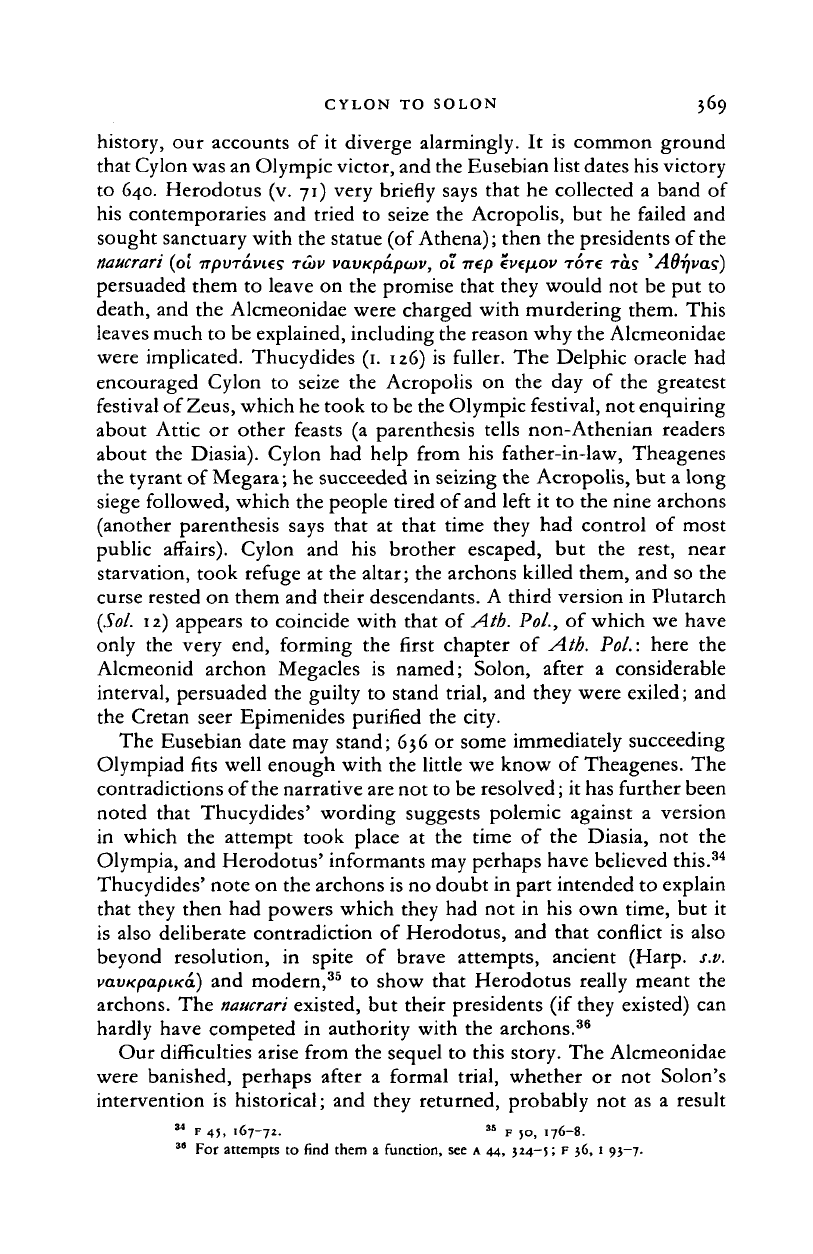
CYLON TO SOLON 369
history, our accounts of it diverge alarmingly. It is common ground
that Cylon was an Olympic victor, and the Eusebian list dates his victory
to 640. Herodotus (v. 71) very briefly says that he collected a band of
his contemporaries and tried to seize the Acropolis, but he failed and
sought sanctuary with the statue (of
Athena);
then the presidents of the
naucrari {oi npvTavi.es rutv vavKpapcov, 01 nep evefiov
TOTC
TCLS
'Ad-qvas)
persuaded them to leave on the promise that they would not be put to
death, and the Alcmeonidae were charged with murdering them. This
leaves much to be explained, including the reason why the Alcmeonidae
were implicated. Thucydides
(1.
126) is fuller. The Delphic oracle had
encouraged Cylon to seize the Acropolis on the day of the greatest
festival of
Zeus,
which he took to be the Olympic festival, not enquiring
about Attic or other feasts (a parenthesis tells non-Athenian readers
about the Diasia). Cylon had help from his father-in-law, Theagenes
the tyrant of Megara; he succeeded in seizing the Acropolis, but a long
siege followed, which the people tired of and left it to the nine archons
(another parenthesis says that at that time they had control of most
public affairs). Cylon and his brother escaped, but the rest, near
starvation, took refuge at the altar; the archons killed them, and so the
curse rested on them and their descendants. A third version in Plutarch
{Sol. 12) appears to coincide with that of Ath. Pol., of which we have
only the very end, forming the first chapter of Ath. Pol.: here the
Alcmeonid archon Megacles is named; Solon, after a considerable
interval, persuaded the guilty to stand trial, and they were exiled; and
the Cretan seer Epimenides purified the city.
The Eusebian date may stand; 636 or some immediately succeeding
Olympiad fits well enough with the little we know of Theagenes. The
contradictions of the narrative are not to be resolved; it has further been
noted that Thucydides' wording suggests polemic against a version
in which the attempt took place at the time of the Diasia, not the
Olympia, and Herodotus' informants may perhaps have believed this.
34
Thucydides' note on the archons is no doubt in part intended to explain
that they then had powers which they had not in his own time, but it
is also deliberate contradiction of Herodotus, and that conflict is also
beyond resolution, in spite of brave attempts, ancient (Harp. s.v.
vavKpapiKa)
and modern,
35
to show that Herodotus really meant the
archons. The
naucrari
existed, but their presidents (if they existed) can
hardly have competed in authority with the archons.
36
Our difficulties arise from the sequel to this story. The Alcmeonidae
were banished, perhaps after a formal trial, whether or not Solon's
intervention is historical; and they returned, probably not as a result
34
F
45)
167-72. » F 50, 176-8.
3
* For attempts to find them a function, see A 44, 324—5; F 36, 1 93-7.
Cambridge Histories Online © Cambridge University Press, 2008
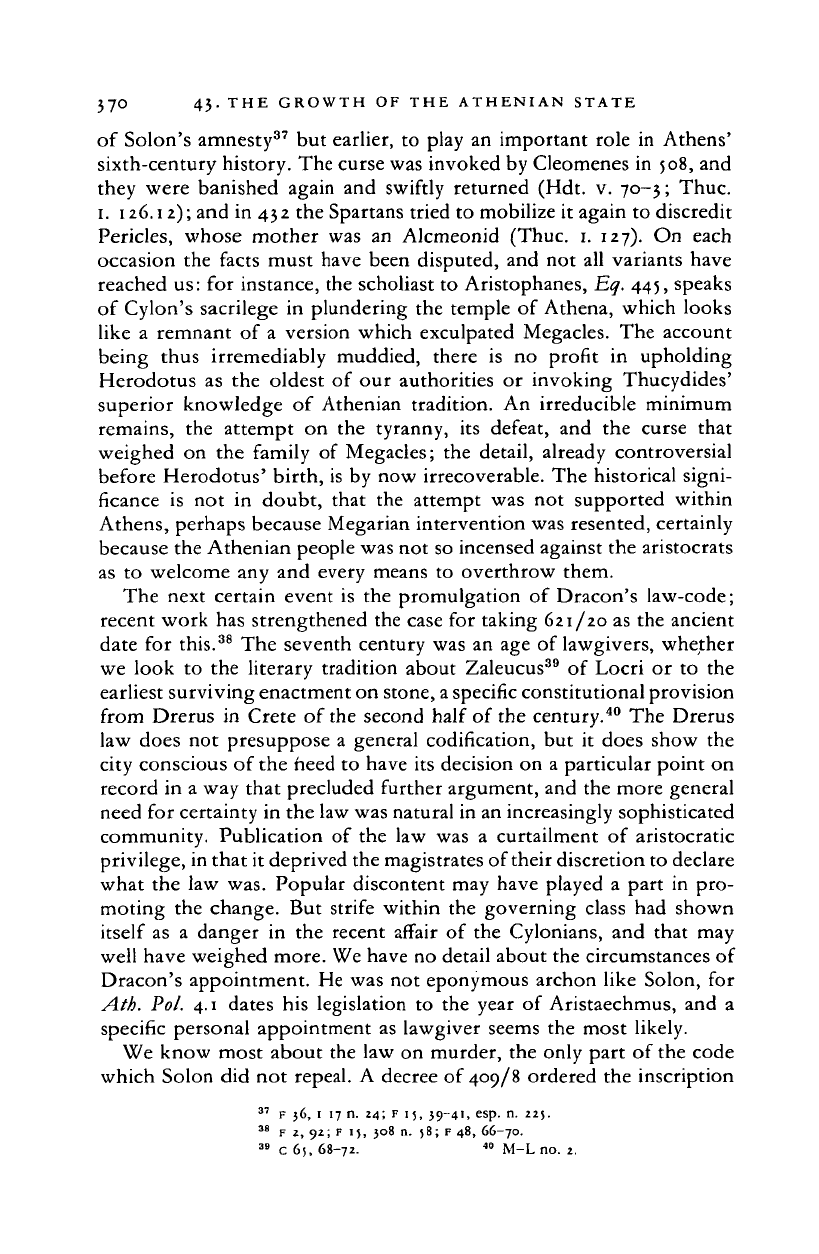
37O 43- THE GROWTH OF THE ATHENIAN STATE
of Solon's amnesty
37
but earlier, to play an important role in Athens'
sixth-century history. The curse was invoked by Cleomenes in 508, and
they were banished again and swiftly returned (Hdt. v. 70-3; Thuc.
1.
126.12); and in
43 2
the Spartans tried to mobilize it again to discredit
Pericles, whose mother was an Alcmeonid (Thuc. 1. 127). On each
occasion the facts must have been disputed, and not all variants have
reached us: for instance, the scholiast to Aristophanes, Eq. 445, speaks
of Cylon's sacrilege in plundering the temple of Athena, which looks
like a remnant of a version which exculpated Megacles. The account
being thus irremediably muddied, there is no profit in upholding
Herodotus as the oldest of our authorities or invoking Thucydides'
superior knowledge of Athenian tradition. An irreducible minimum
remains, the attempt on the tyranny, its defeat, and the curse that
weighed on the family of Megacles; the detail, already controversial
before Herodotus' birth, is by now irrecoverable. The historical signi-
ficance is not in doubt, that the attempt was not supported within
Athens, perhaps because Megarian intervention was resented, certainly
because the Athenian people was not so incensed against the aristocrats
as to welcome any and every means to overthrow them.
The next certain event is the promulgation of Dracon's law-code;
recent work has strengthened the case for taking 621/20 as the ancient
date for this.
38
The seventh century was an age of lawgivers, whether
we look to the literary tradition about Zaleucus
39
of Locri or to the
earliest surviving enactment on stone,
a
specific constitutional provision
from Drerus in Crete of the second half of the century.
40
The Drerus
law does not presuppose a general codification, but it does show the
city conscious of the heed to have its decision on a particular point on
record in a way that precluded further argument, and the more general
need for certainty in the law was natural in an increasingly sophisticated
community. Publication of the law was a curtailment of aristocratic
privilege, in that it deprived the magistrates of their discretion to declare
what the law was. Popular discontent may have played a part in pro-
moting the change. But strife within the governing class had shown
itself as a danger in the recent affair of the Cylonians, and that may
well have weighed more. We have no detail about the circumstances of
Dracon's appointment. He was not eponymous archon like Solon, for
Ath.
Pol. 4.1 dates his legislation to the year of Aristaechmus, and a
specific personal appointment as lawgiver seems the most likely.
We know most about the law on murder, the only part of the code
which Solon did not repeal. A decree of 409/8 ordered the inscription
37
F 36, 1 17 n. 24; F 15,
39-41,
esp. n. 22J.
38
F 2, 92; F 15, 308 n. 58; F 48, 66-70.
39
c 65, 68-72. •"> M-L no. 2.
Cambridge Histories Online © Cambridge University Press, 2008
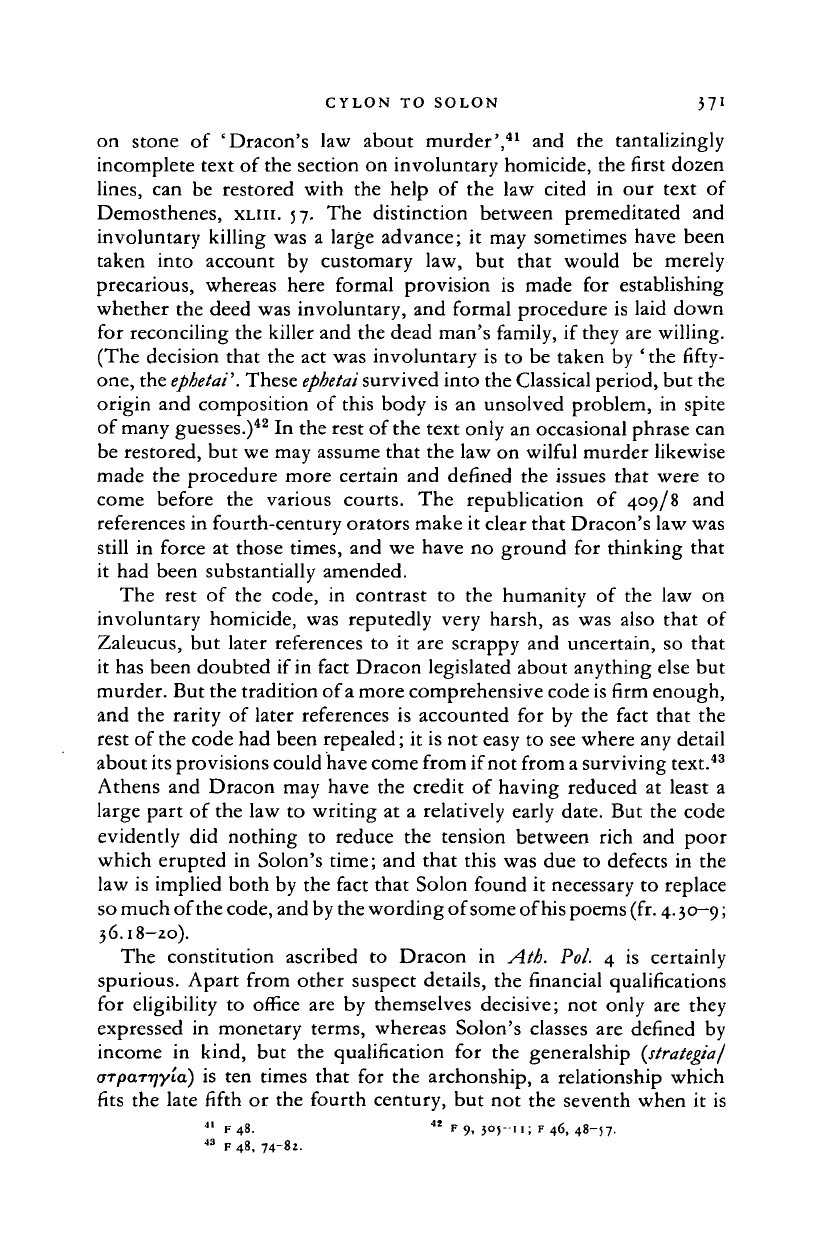
CYLON TO SOLON 371
on stone of 'Dracon's law about murder',
41
and the tantalizingly
incomplete text of the section on involuntary homicide, the first dozen
lines,
can be restored with the help of the law cited in our text of
Demosthenes,
XLIII. 57. The distinction between premeditated and
involuntary killing was a large advance; it may sometimes have been
taken into account by customary law, but that would be merely
precarious, whereas here formal provision is made for establishing
whether the deed was involuntary, and formal procedure is laid down
for reconciling the killer and the dead man's family, if they are willing.
(The decision that the act was involuntary is to be taken by ' the fifty-
one,
the
epbetai'.
These
ephetai
survived into the Classical period, but the
origin and composition of this body is an unsolved problem, in spite
of many guesses.)
42
In the rest of the text only an occasional phrase can
be restored, but we may assume that the law on wilful murder likewise
made the procedure more certain and defined the issues that were to
come before the various courts. The republication of 409/8 and
references in fourth-century orators make it clear that Dracon's law was
still in force at those times, and we have no ground for thinking that
it had been substantially amended.
The rest of the code, in contrast to the humanity of the law on
involuntary homicide, was reputedly very harsh, as was also that of
Zaleucus, but later references to it are scrappy and uncertain, so that
it has been doubted if in fact Dracon legislated about anything else but
murder. But the tradition of a more comprehensive code is firm enough,
and the rarity of later references is accounted for by the fact that the
rest of the code had been repealed; it is not easy to see where any detail
about its provisions could have come from if not from
a
surviving text.
43
Athens and Dracon may have the credit of having reduced at least a
large part of the law to writing at a relatively early date. But the code
evidently did nothing to reduce the tension between rich and poor
which erupted in Solon's time; and that this was due to defects in the
law is implied both by the fact that Solon found it necessary to replace
so much of the
code,
and by the wording of some of his poems (fr. 4.30—9;
36.18-20).
The constitution ascribed to Dracon in Atb. Pol. 4 is certainly
spurious. Apart from other suspect details, the financial qualifications
for eligibility to office are by themselves decisive; not only are they
expressed in monetary terms, whereas Solon's classes are defined by
income in kind, but the qualification for the generalship
(strategia/
oTpaTTjyia)
is ten times that for the archonship, a relationship which
fits the late fifth or the fourth century, but not the seventh when it is
41
F48. " F
9
, 305-11; F 46, 48-57.
43
F 48, 74-82.
Cambridge Histories Online © Cambridge University Press, 2008
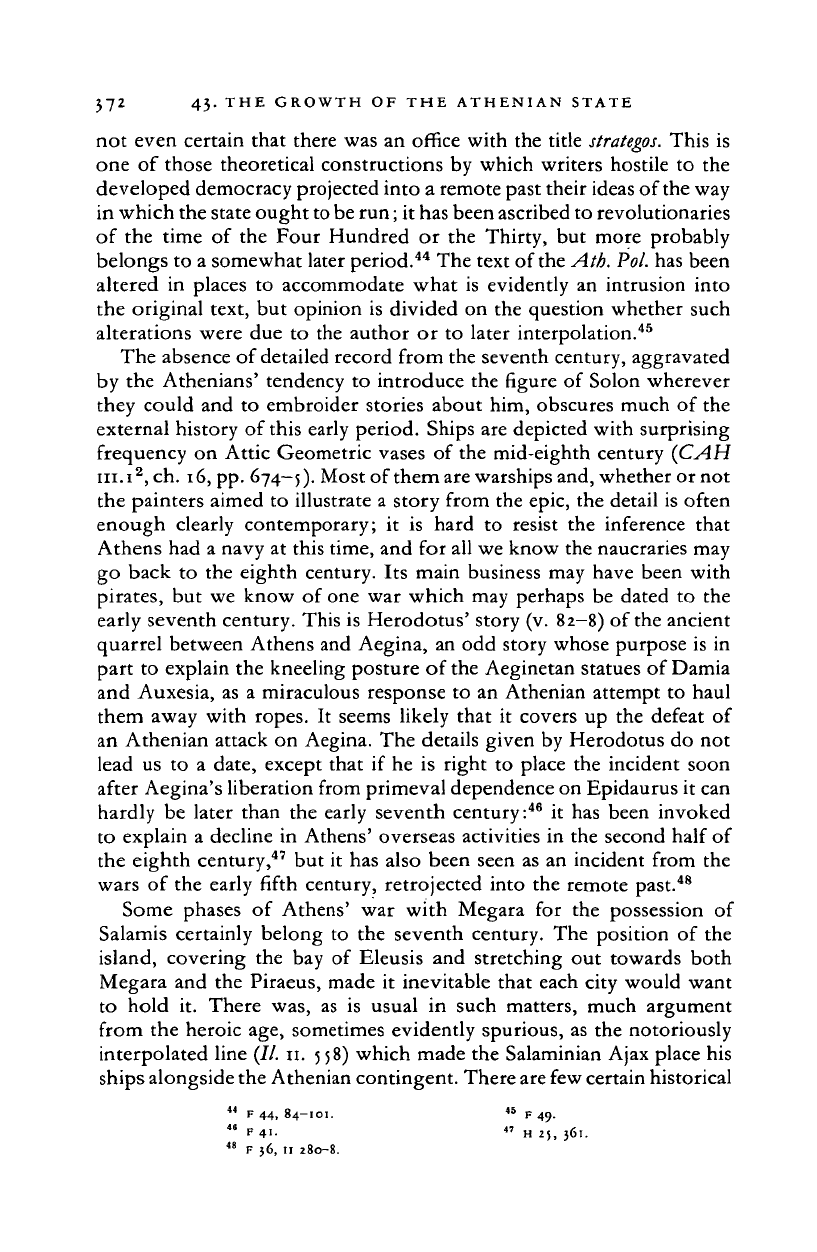
372 43- THE GROWTH OF THE ATHENIAN STATE
not even certain that there was an office with the title
strategos.
This
is
one
of
those theoretical constructions by which writers hostile
to
the
developed democracy projected into a remote past their ideas of the way
in which the state ought to be run; it has been ascribed to revolutionaries
of the time
of
the Four Hundred
or
the Thirty, but more probably
belongs to a somewhat later period.
44
The text of
the
Ath.
Pol.
has been
altered
in
places
to
accommodate what
is
evidently an intrusion into
the original text, but opinion is divided on the question whether such
alterations were due
to
the author
or
to later interpolation.
45
The absence of detailed record from the seventh century, aggravated
by the Athenians' tendency
to
introduce the figure
of
Solon wherever
they could and
to
embroider stories about him, obscures much
of
the
external history of this early period. Ships are depicted with surprising
frequency on Attic Geometric vases
of
the mid-eighth century (CAH
in. i
2
, ch. 16, pp. 674-5). Most of them are warships and, whether or not
the painters aimed to illustrate a story from the epic, the detail is often
enough clearly contemporary;
it is
hard
to
resist the inference that
Athens had a navy at this time, and for all we know the naucraries may
go back
to
the eighth century.
Its
main business may have been with
pirates, but we know of one war which may perhaps be dated
to
the
early seventh century. This is Herodotus' story (v. 82—8) of the ancient
quarrel between Athens and Aegina, an odd story whose purpose is in
part to explain the kneeling posture of the Aeginetan statues of Damia
and Auxesia, as
a
miraculous response to an Athenian attempt to haul
them away with ropes.
It
seems likely that
it
covers up the defeat
of
an Athenian attack on Aegina. The details given by Herodotus do not
lead
us to a
date, except that
if
he
is
right
to
place the incident soon
after Aegina's liberation from primeval dependence on Epidaurus it can
hardly be later than the early seventh century:
46
it
has been invoked
to explain
a
decline in Athens' overseas activities in the second half of
the eighth century,
47
but
it
has also been seen as an incident from the
wars
of
the early fifth century, retrojected into the remote past.
48
Some phases
of
Athens'
war
with Megara
for the
possession
of
Salamis certainly belong
to
the seventh century. The position
of
the
island, covering the bay
of
Eleusis and stretching out towards both
Megara and the Piraeus, made
it
inevitable that each city would want
to hold
it.
There was,
as is
usual
in
such matters, much argument
from the heroic age, sometimes evidently spurious, as the notoriously
interpolated line (//.
11.
5
58) which made the Salaminian Ajax place his
ships alongside the Athenian contingent. There are few certain historical
44
F
44, 84-IOI.
45
F 49.
" F4I.
«
H 2), 361.
48
F
j6,
II
280-8.
Cambridge Histories Online © Cambridge University Press, 2008
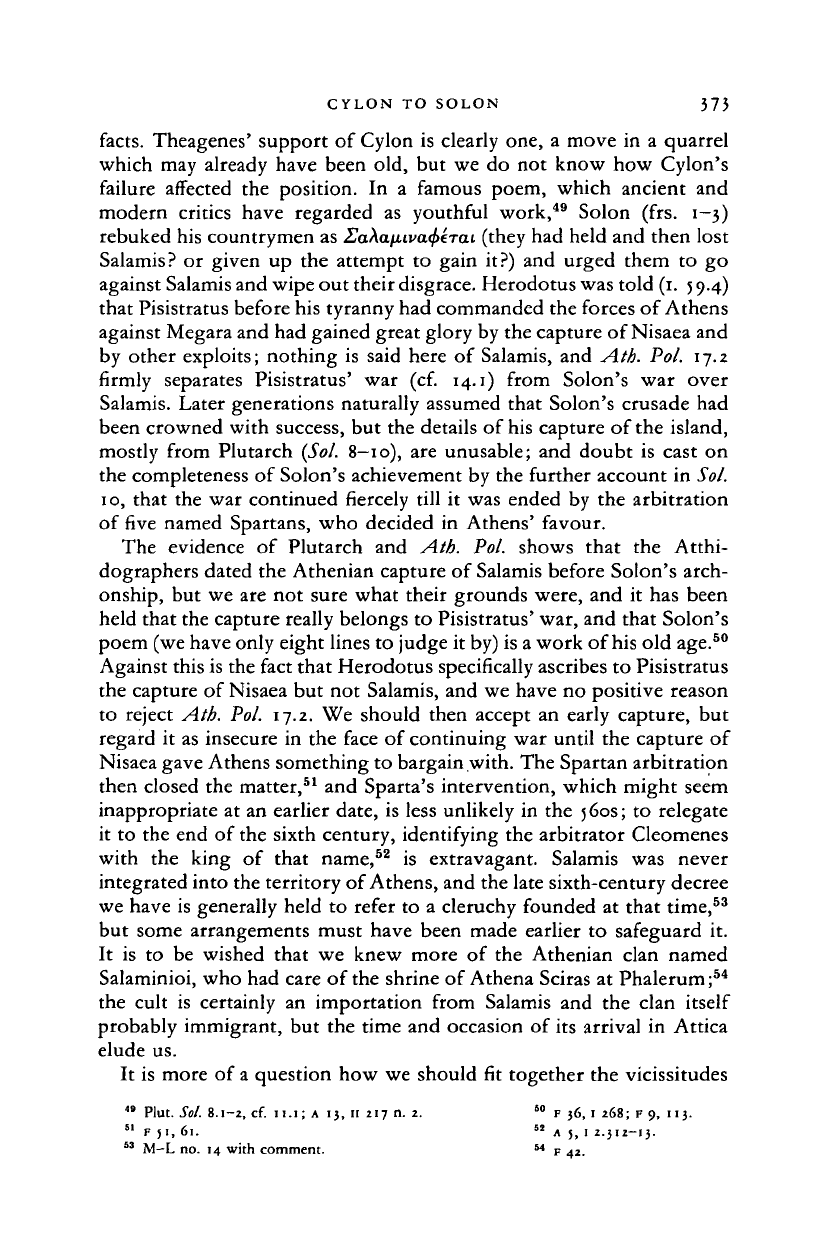
CYLON TO SOLON 373
facts.
Theagenes' support of Cylon is clearly one, a move in a quarrel
which may already have been old, but we do not know how Cylon's
failure affected the position. In a famous poem, which ancient and
modern critics have regarded as youthful work,
49
Solon (frs. 1-3)
rebuked his countrymen as
Ha\afiiva<f>€Tai
(they had held and then lost
Salamis? or given up the attempt to gain it?) and urged them to go
against Salamis and wipe out their
disgrace.
Herodotus was told
(1.
5
9.4)
that Pisistratus before his tyranny had commanded the forces of Athens
against Megara and had gained great glory by the capture of Nisaea and
by other exploits; nothing is said here of Salamis, and Ath. Pol. ij.z
firmly separates Pisistratus' war (cf. 14.1) from Solon's war over
Salamis. Later generations naturally assumed that Solon's crusade had
been crowned with success, but the details of his capture of the island,
mostly from Plutarch
{Sol.
8-10), are unusable; and doubt is cast on
the completeness of Solon's achievement by the further account in Sol.
10,
that the war continued fiercely till it was ended by the arbitration
of five named Spartans, who decided in Athens' favour.
The evidence of Plutarch and Ath. Pol. shows that the Atthi-
dographers dated the Athenian capture of Salamis before Solon's arch-
onship, but we are not sure what their grounds were, and it has been
held that the capture really belongs to Pisistratus' war, and that Solon's
poem (we have only eight lines to judge it by) is a work of
his
old age.
50
Against this is the fact that Herodotus specifically ascribes to Pisistratus
the capture of Nisaea but not Salamis, and we have no positive reason
to reject Ath. Pol. 17.2. We should then accept an early capture, but
regard it as insecure in the face of continuing war until the capture of
Nisaea gave Athens something to bargain with. The Spartan arbitration
then closed the matter,
51
and Sparta's intervention, which might seem
inappropriate at an earlier date, is less unlikely in the
5
60s;
to relegate
it to the end of the sixth century, identifying the arbitrator Cleomenes
with the king of that name,
52
is extravagant. Salamis was never
integrated into the territory of
Athens,
and the late sixth-century decree
we have is generally held to refer to a cleruchy founded at that time,
53
but some arrangements must have been made earlier to safeguard it.
It is to be wished that we knew more of the Athenian clan named
Salaminioi, who had care of the shrine of Athena Sciras at Phalerum;
54
the cult is certainly an importation from Salamis and the clan itself
probably immigrant, but the time and occasion of its arrival in Attica
elude us.
It is more of a question how we should fit together the vicissitudes
49
Plut. Sol. 8.1-2, cf. 11.1; A 13, 11 217 n. 2.
60
F 36, 1 268; F 9, 113.
51
F ji, 61. " A 5, 1 2.312-13.
53
M-L no. 14 with comment.
M
F 42.
Cambridge Histories Online © Cambridge University Press, 2008
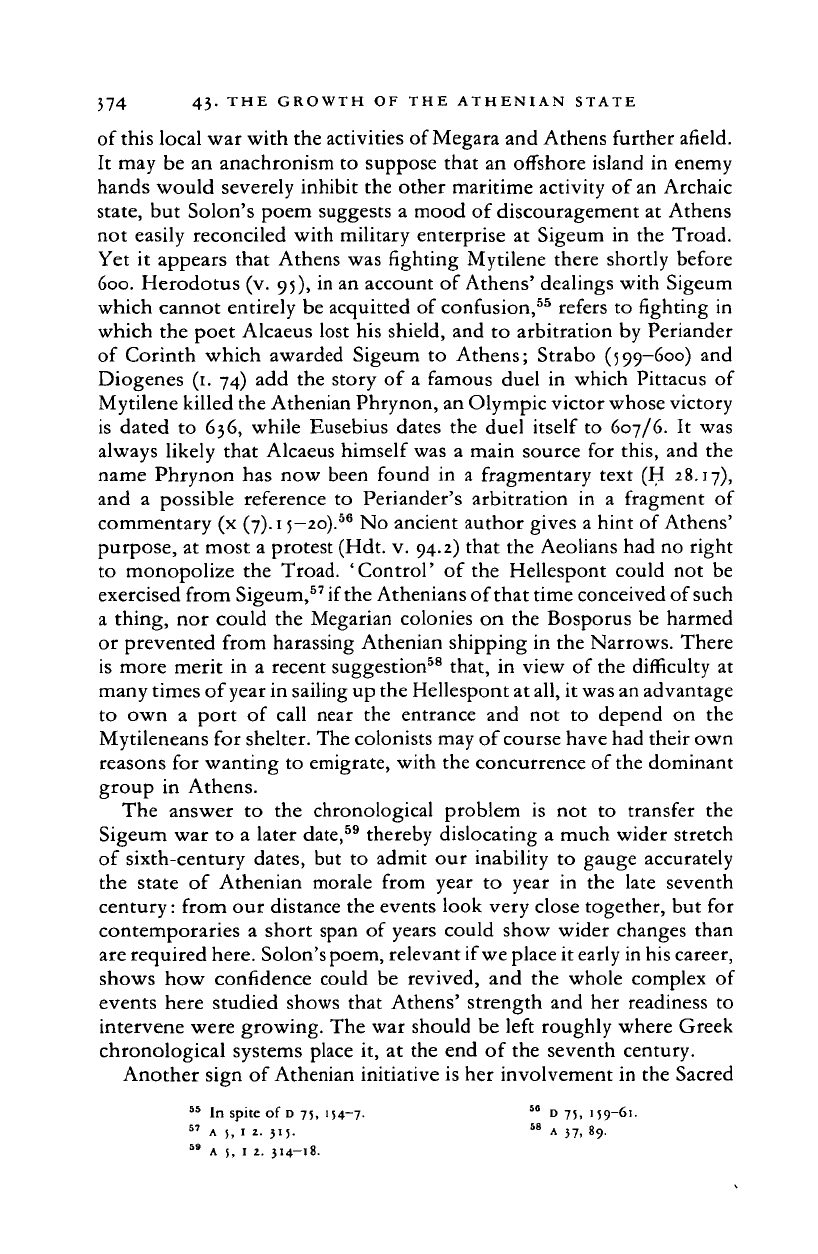
}74 43- THE GROWTH OF THE ATHENIAN STATE
of this local war with the activities of Megara and Athens further afield.
It may be an anachronism to suppose that an offshore island in enemy
hands would severely inhibit the other maritime activity of an Archaic
state,
but Solon's poem suggests
a
mood of discouragement at Athens
not easily reconciled with military enterprise
at
Sigeum
in
the Troad.
Yet
it
appears that Athens was fighting Mytilene there shortly before
600.
Herodotus (v. 95), in an account of Athens' dealings with Sigeum
which cannot entirely be acquitted of confusion,
55
refers to fighting
in
which the poet Alcaeus lost his shield, and
to
arbitration by Periander
of Corinth which awarded Sigeum
to
Athens; Strabo (599-600) and
Diogenes (1. 74) add the story
of
a famous duel
in
which Pittacus
of
Mytilene killed the Athenian Phrynon, an Olympic victor whose victory
is dated
to
636, while Eusebius dates the duel itself to 607/6.
It
was
always likely that Alcaeus himself was
a
main source for this, and the
name Phrynon has now been found
in a
fragmentary text (H 28.17),
and
a
possible reference
to
Periander's arbitration
in a
fragment
of
commentary (x (7).i 5-20).
56
No ancient author gives a hint of Athens'
purpose, at most a protest (Hdt. v. 94.2) that the Aeolians had no right
to monopolize the Troad. 'Control'
of
the Hellespont could not
be
exercised from Sigeum,
57
if the Athenians of that time conceived of such
a thing, nor could the Megarian colonies on the Bosporus be harmed
or prevented from harassing Athenian shipping in the Narrows. There
is more merit
in a
recent suggestion
58
that,
in
view of the difficulty
at
many times of year in sailing up the Hellespont at
all,
it was an advantage
to own
a
port
of
call near the entrance
and not to
depend
on the
Mytileneans for shelter. The colonists may of course have had their own
reasons for wanting to emigrate, with the concurrence of the dominant
group
in
Athens.
The answer
to the
chronological problem
is not to
transfer
the
Sigeum war to
a
later date,
59
thereby dislocating
a
much wider stretch
of sixth-century dates, but
to
admit our inability
to
gauge accurately
the state
of
Athenian morale from year
to
year
in the
late seventh
century: from our distance the events look very close together, but for
contemporaries
a
short span
of
years could show wider changes than
are required here. Solon's poem, relevant if we place it early in his career,
shows how confidence could
be
revived, and the whole complex
of
events here studied shows that Athens' strength and her readiness
to
intervene were growing. The war should be left roughly where Greek
chronological systems place it,
at
the end
of
the seventh century.
Another sign of Athenian initiative is her involvement in the Sacred
55
In
spite
of
D 75, 154-7-
58
o 7;,
159-61.
67
A 5, 1 2. 315.
58
A 37, 89.
59
A 5, 1 2.
314-18.
Cambridge Histories Online © Cambridge University Press, 2008
